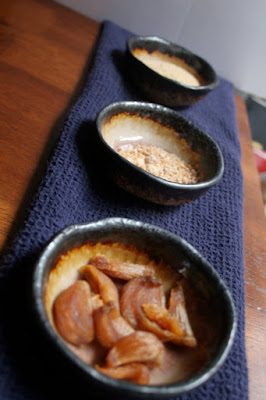Ask Pablo: Octopus Sous Vide and Doneness.
On an earlier post about Sous Vide Octopus, erich wrote:
 /Myhrvold
/Myhrvold charts. Bag item. Put item in x temperature waterbath for y minutes based on an estimated thickness. Remove.
charts. Bag item. Put item in x temperature waterbath for y minutes based on an estimated thickness. Remove.
In other words, completely remove aroma and taste as indicators of doneness. I think that works well for some items (e.g. eggs or really uniform cuts that you deal with regularly). For everything else, I ultimately rely on a gentle squeeze of the bag. Or, if I am using the Cooking Issues technique of using ziplocks, I'll open the bag real quick for a look-see.
Don't get me wrong. I still use the guides to help me get me close. But, after that, I dig a little deeper and get some more insight.
Thanks erich for making me think about that.
Ok, I need some help here.I responded with:
Bought a whole octopus, thawed it, cleaned it, vacuum bagged it, and cooked it for 2 hours at 180F in my sous vide bath. The thing came out very rubbery. Basically the same consistency one would achieve pan frying it. Anything, I'm missing here?
BTW, this is not first sous vide dish, but definitely the one that didn't come out at all.
My guess is that you needed to leave it in the water bath longer, but here are things that may be different between You and I:This question got me thinking a lot about sous vide cooking. When I first started doing it, I relied a lot of the Baldwin
1. Size of Octopus. I don't know how thick your Octopus was. Any guess on it's size? Even weight might be helpful.
2. Fresh vs. Frozen. Not saying I know for sure that mine wasn't frozen earlier, but I bought mine in non-frozen form at a fish monger.
If yours was larger and colder to start with, it might take longer to get tender. Finally, another thing I do is occasionally squeeze the octopus through the bag to get a sense of texture.
In other words, completely remove aroma and taste as indicators of doneness. I think that works well for some items (e.g. eggs or really uniform cuts that you deal with regularly). For everything else, I ultimately rely on a gentle squeeze of the bag. Or, if I am using the Cooking Issues technique of using ziplocks, I'll open the bag real quick for a look-see.
Don't get me wrong. I still use the guides to help me get me close. But, after that, I dig a little deeper and get some more insight.
Thanks erich for making me think about that.



I just did a sous vide octopus in butternut squash soup. It was fantastic. I cooked it much longer at 185F (5 hours) and it came out firm and not rubbery.
ReplyDelete